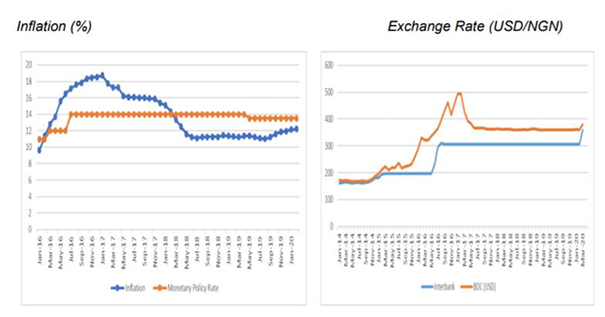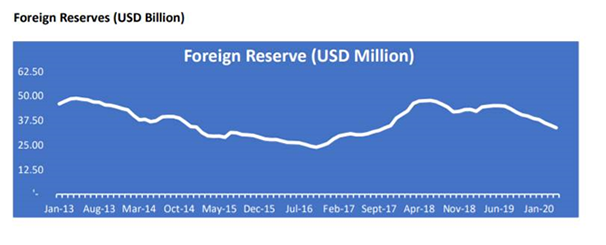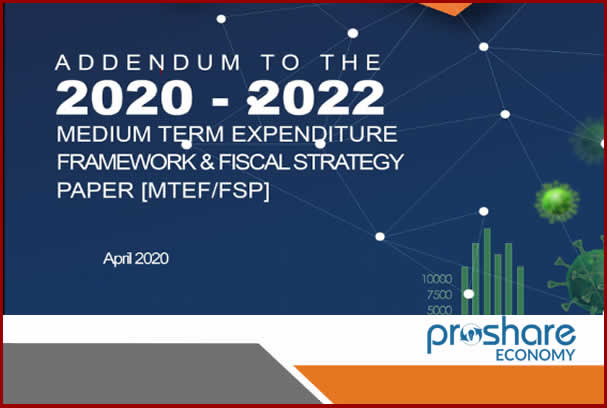Tuesday, May26, 2020 / 11:25 AM / by Budget Office and Federal Ministry ofFinance, Budget and National Planning
Introduction
Followingthe outbreak of the Coronavirus Disease (COVID-19), and its rapid spin into aglobal pandemic in Q1 2020; there has been corresponding economic consequence.There has been a slow-down of global economic activities as most countries areon lockdown with movement only limited to essential goods or persons performingessential services. Correspondingly, international oil prices have plungedtriggered by the Saudi-Russia oil war and weakening global oil demand. Oil andGas represents only about 10% of Nigeria's GDP. However, it accounts for about50% of government revenues and over 90% of export earnings.
Thus inresponding to the fiscal implication of the pandemic and oil price war, Mr.President, on Monday, 9th March 2020, set up a Crisis Management Committee(CMC) comprising Senior Government officials headed by the Hon. Minister ofFinance Budget & National Planning to consider measures to address thefiscal pressures arising from the recent drop in oil prices. Further to theabove, most of the assumptions underpinning the 2020 FGN Budget have had to berevised in the face of current realties, as Nigeria is vulnerable to the currentglobal economic disruption caused by the COVID-19 crisis exposed to the risksof both a pronounced decline in oil prices & spikes in risk aversion in theglobal capital markets.
Althoughsimilar challenges were experienced in 2015/2016, Nigeria now has considerablylower fiscal buffers. This addendum to the 2020-2021 Medium Term fiscalFramework and Fiscal Strategy Paper, (MTEF/FSP), is to provide a postscript tothe initial publication and update with the revised assumptions and fiscalstrategy in the face of current economic realities posed by COVID-19.
Update On Macroeconomic Performance Of TheNigerian Economy
The economy has grappled for acceleration in realGDP growth since the exit from recession in Q2 2017. In spite of elevenconsecutive quarters of positive growth, GDP growth rates remain belowdesirable targets (growing below population growth rate).
Prior to the outbreak of COVID-19 pandemic, theNigerian economy had been characterised by wavering external sector andimproving internal economic indicators. Over-dependence on oil revenue,constrained fiscal space, low foreign and domestic investments and, decliningforeign reserves made the economy disproportionately vulnerable to the twinshocks of crude oil price/production collapse and a health crisis. The informalsector which accounts for over half of Nigeria's GDP will be negativelyimpacted.
2.1 Monetary Sector
There has been a continued uptick in headlineinflation (year-on-year) for the seventh consecutive month to 12.26 per cent inMarch 2020 from 11.02 per cent in August 2019. The rising inflation, waslargely attributed to increases in the food and core components, which rose to14.98 and 9.73 per cent in February 2020, from 13.17 and 9.7 per cent in August2019, respectively. Furthermore, the surge in demand for food produce inanticipation of the lockdown have further contributed to the hike in inflationrate.

TheCentral Bank has adopted measures to rein in inflation by managing excessliquidity in the banking system, which is also aimed at reducing pressure inthe foreign exchange market, with resultant depreciation of the Naira.
2.2 External Sector
Nigeria'sforeign reserves have declined to US$35.9 billion in March 2020 from US$44.7billion in April 2019. The decrease is largely attributable to the impact ofthe decline in crude oil receipts. Monetary policy rates have been relativelyunchanged with the goals of supporting growth and employment and checkingcapital outflows to support external reserves accretion.
Theuncertainty and general decline in global economic activities caused by theCOVID-19 pandemic have further dimmed the prospect of reversing the downwardtrend in foreign portfolio investments (FPIs) in the Nigerian Treasury Bills(NTBs), also adversely impacted by the Covid-19 inspired flight to safety,represent the second biggest source of dollar inflow into the country aftercrude oil.

2.3 Fiscal Sector
Fiscalbuffers are very lean. With external debt standing at USD 26.94 billion andExcess Crude Account (ECA) barely USD71 million, Balance of Trade (BOT) atUDS18.7 billion and widening fiscal deficit on account of lower oil revenue,the fiscal space is critically constrained. Tax as a percentage of GDP (8%) hasbeen suboptimal while debt service to revenue at over 50% is high andworsening.
Governmentis seizing the opportunity of the crisis to intensify economic diversificationto ensure a growth in non-oil exports, reduction in import bill and improvingcompetitiveness. Nigeria is currently implementing a modest stimulus packageand providing palliatives for the most vulnerable members of the society.
Related News
- MTEF Review: VAT Increase Could Be A Smoke Screen For Something Larger
- 2019-2021 MTEF and Fiscal Strategy - First Fiscal Projections Through to 2021
- Bond yields drop as Senate approves the FG’s MTEF
- Non-Oil Revenue Forecasts In MTEF and FSP Aligns with Pro-Rata Earnings to Date
- Senate Gets Down To Some Serious Work - Addresses MTEF, Aviation Crisis, CAMA, Ports Bill, IDPs
- Budget/MTEF Document Inaccuracies: Time to Reverse this Trend
- The 2017-2019 Medium Term Expenditure Framework (MTEF) is Incomplete – BudgIT
- Some Hopeful Projections in the MTEF
- MTEF: Financing the Deficit in the 2016 Budget
- How far can Nigeria go without Plan-based MTEF and Annual budgets?
 Lagos, NG • GMT +1
Lagos, NG • GMT +1











 2304 views
2304 views








 Sponsored Ad
Sponsored Ad
 Advertise with Us
Advertise with Us









